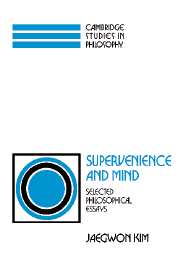Book contents
- Frontmatter
- Contents
- Preface
- Sources
- Part I Events and supervenience
- 1 Causation, nomic subsumption, and the concept of event
- 2 Noncausal connections
- 3 Events as property exemplifications
- 4 Concepts of supervenience
- 5 “Strong” and “global” supervenience revisited
- 6 Epiphenomenal and supervenient causation
- 7 Supervenience for multiple domains
- 8 Supervenience as a philosophical concept
- 9 Postscripts on supervenience
- Part II Mind and mental causation
- Index
6 - Epiphenomenal and supervenient causation
Published online by Cambridge University Press: 28 January 2010
- Frontmatter
- Contents
- Preface
- Sources
- Part I Events and supervenience
- 1 Causation, nomic subsumption, and the concept of event
- 2 Noncausal connections
- 3 Events as property exemplifications
- 4 Concepts of supervenience
- 5 “Strong” and “global” supervenience revisited
- 6 Epiphenomenal and supervenient causation
- 7 Supervenience for multiple domains
- 8 Supervenience as a philosophical concept
- 9 Postscripts on supervenience
- Part II Mind and mental causation
- Index
Summary
EPIPHENOMENAL CAUSATION
Jonathan Edwards held the doctrine that ordinary material things do not persist through time but are at each moment created, and recreated, by God ex nihilo. He writes:
If the existence of created substance, in each successive moment, be wholly the effect of God's immediate power, in that moment, without any dependence on prior existence, as much as the first creation out of nothing, then what exists at this moment, by this power, is a new effect, and simply and absolutely considered, not the same with any past existence, though it be like it, and follows it according to a certain established method.
Thus, the present “time slice” of this table, although it is very much like the one preceding it, has no causal connection with it; for each slice is a wholly distinct creation by God. The temporal parts of this table are successive effects of an underlying persisting cause, God's creative activity. In arguing for this doctrine, Edwards offers the following striking analogy:
The images of things in a glass, as we keep our eye upon them, seem to remain precisely the same, with a continuing, perfect identity. But it is known to be otherwise. Philosophers well know that these images are constantly renewed, by the impression and reflection of new rays of light; so that the image impressed by the former rays is constantly vanishing, and a new image impressed by new rays every moment, both on the glass and on the eye … And the new images being put on immediately or instantly, do not make them the same, any more than if it were done with the intermission of an hour or a day. […]
- Type
- Chapter
- Information
- Supervenience and MindSelected Philosophical Essays, pp. 92 - 108Publisher: Cambridge University PressPrint publication year: 1993
- 3
- Cited by



